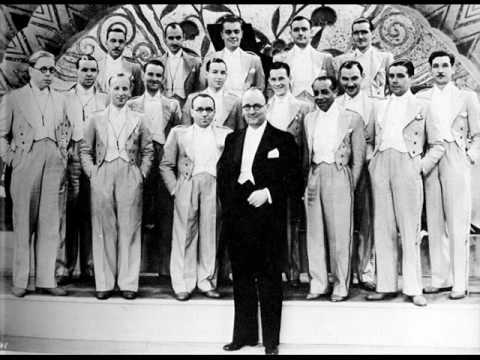St Louis Blues – Billy Cotton & His Band, 1934
Billy Cotton & His Band, with Vocal Chorus – St Louis Blues (W.C.Handy), Columbia 1934
——————————————————————-
NOTES: St. LOUIS BLUES was written by William Christopher Handy over eighty years ago, and ever since it has been played and enjoyed the world over, as the most long lived and popular blues song ever written. This song has made millions of dollars in sales, inspired motion pictures, and brought fame to its singers. W.C. Handy found his inspiration for the song containing the Afro-Spanish habanera rhythms (heard by Handy when he toured Cuba with his minstrel show at the turn of the century) – while wandering the streets of St. Louis. He later said his aim was “to combine ragtime syncopation with a real melody in the spiritual tradition.” The legend says, one afternoon he met a black woman tormented by her husband’s absence. She told Handy: “Ma man’s got a heart like a rock cast in de sea.” Handy, forty years old at the time, drew his inspiration for many of his songs from African-American words and music, so it is not surprising that he began to compose a theme to this woman’s anguish
The song, along with many of Handy’s, was composed in Pewee Bar in Memphis the headquarters for Handy’s band and many other African American musicians on Beale Street (Pewee was owned by an Italian immigrant named Pee Wee). In back, there was a room where musicians could check their instruments and take calls for future performances. The establishment, like many similar ones on Beale Street, never closed, so it was always available as a place for rest, relaxation, and introspection for African-American performers. The song that would become the best known blues in the world was initially turned down by every publisher, until it began to receive some notice in New York City two years later. It was first performed publicly in that city by an unknown female impersonator, though in the audience was a young Ethel Waters, who acquired the performance rights from Handy and became the first woman to publicly perform the classic.
————————————–
William Edward COTTON (1899 1969), better known as Billy Cotton, was a British band leader and entertainer, one of the few whose orchestras survived the dance band era. Today, he is mainly remembered as a 1950s and 1960s radio and television personality, although his musical talent emerged as early as the 1920s. Born in Smith Square, London, Cotton was a choirboy and then started his musical career as a drummer, an occupation he also pursued in the army during the First World War. He enlisted in the Royal Fusiliers by falsifying his age and saw service in Malta and Egypt. Later in the war he was recommended for a commission and learned to fly Bristol Fighter aircraft. He was then not yet 19 years old.
In the inter-war years he had several jobs such as bus driver before setting up his own orchestra, the London Savannah Band, in 1924. At first a straight dance band, over the years the London Savannah Band more and more tended towards music hall/vaudeville entertainment, introducing all sorts of visual and verbal humour in between songs. Famous musicians that played in Billy Cotton’s band during the 1920s and 1930s included Arthur Rosebery, Syd Lipton and Nat Gonella. They made numerous records for Decca and Columbia. After the war, he started his successful Sunday lunchtime radio show on BBC, the Billy Cotton Band Show, which ran from 1949 to 1968. It regularly opened with the band’s signature tune and Cotton’s call of “Wakey Wakey”. From 1957, it was also broadcast on BBC television. In 1962 Billy Cotton suffered a stroke. He died in 1969 while watching a boxing match at Wembley.
source



Comments are closed.